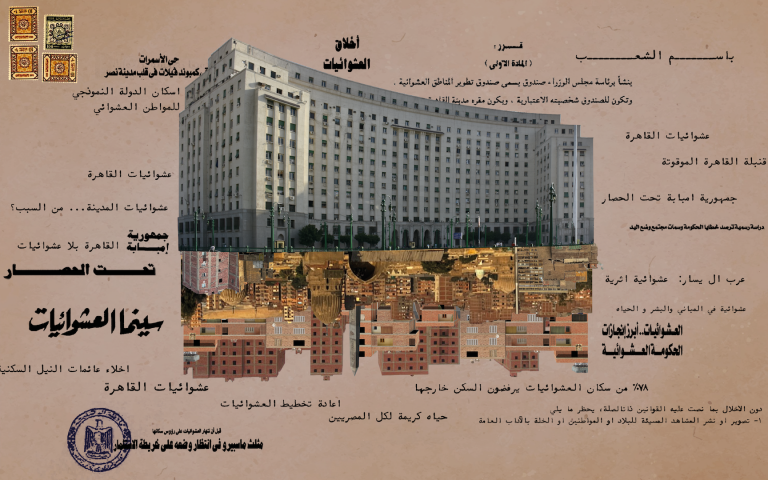 Research
Research

Subject
Demystifying ʿAshwaʾiyyat: A Critique of the Discourse around Cairene Urban Informality
First and second supervisors
Abstract
Sixty to seventy percent of the Cairene population is said to live in informal areas, known by the name ʿashwaʾiyyat, putting Cairo at the heart of urban literature on informality. However, urban research has focused only on informal spaces linked with poverty, lack of modern infrastructure, and state intervention, overlooking a local narrative by different city stakeholders in which other urban forms are also considered ʿashwaʾiyyat. Accordingly, this research investigates this alternative perspective by exploring other possible typologies and classifications of ʿashwaʾiyyat, which could be used to deepen understanding of urban informality in Cairo and beyond.
Studies of informal practices have generally privileged state-led definitions of what is and is not considered informal, something immediately problematised in Cairo as thousands of people are threatened to be displaced, and hundreds of valuable and historic buildings are put at risk of demolition. The research, therefore, challenges these state-led definitions by revealing the distinctive characteristics of ʿashwaʾiyyat that lie beyond what the Egyptian state ‘sees’ as informal.
The research builds its argument based on the author’s first-hand experience and knowledge of the city, combined with primary and secondary sources, which indicate alternative realities of urban informality on the ground. The study employs mixed archival and fieldwork methods to unpack the broad understanding of Cairene urban informality. These methods generate a range of textual and visual data that question the logic of how urban informality is taught and implemented in the planning and management of Cairo. Archives of the state-sponsored press, TV and film industry are examined, and questions regarding architectural and urban pedagogy in Egypt and the public’s understanding of urban informality are discussed. The spatial, aesthetic, and urban manifestations of ʿashwaʾiyyat in Cairo are researched and analysed, deciphering an underexplored facet of the city’s urbanity.
Biography
Omar Abolnaga is an architect and researcher in urban and architectural history and theory. Holding BSc and MSc degrees in architecture from the department of architectural engineering at Cairo University, Abolnaga worked between 2017 and 2021 as a full-time educator and researcher at Cairo University and the American University in Cairo. His previous research project at Cairo University investigated the influence of European post-Renaissance ideology on shaping Cairo’s post-traditional architecture, taking Cairene Islamic religious buildings as a case study. Abolnaga is an Egyptian scholar currently conducting his PhD research in the stream of architectural and urban history and theory at the Bartlett School of Architecture, UCL.
Publications
- Abolnaga, O. (2020). Influence of Post-Renaissance Ideology on Egyptian Post-Traditional Architecture: A Case Study of Cairene Islamic Religious Buildings. MSc Thesis.
- Abolnaga, O. (2022). Mashrouʿ Leila — Glimpses of Hope within the Despair of Contemporary Arab Pop Culture. Available at: https://medium.com/@omarabolnaga/mashrou-leila-glimpses-of-hope-within-t....
Links
- Visit Omar Abolnaga's Twitter profile
- Visit Omar Abolnaga's LinkedIn profile
- Visit Omar Abolnaga's Instagram profile
- Read Omar Abolnaga's work on Medium
Image: Omar Abolnaga, 2022
 Close
Close

